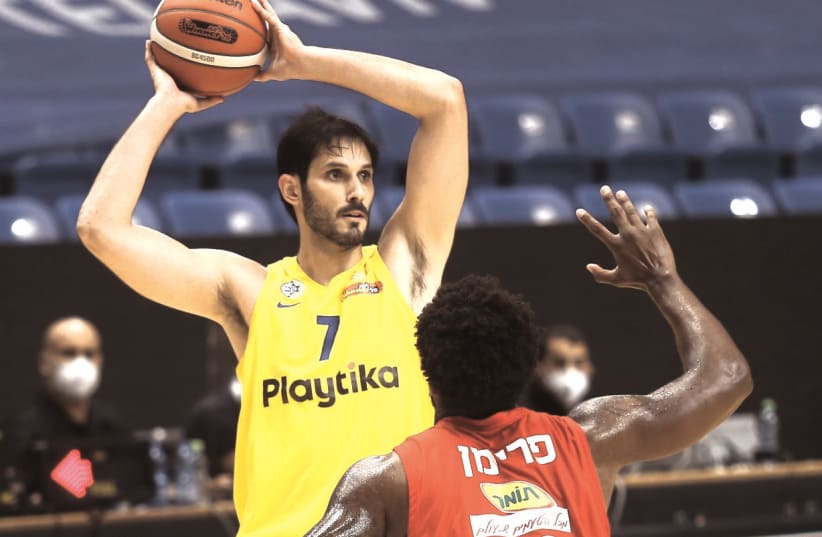As the Israel Basketball League resumed play on Thursday night in northern areas of the country, many teams will have to make do with makeshift rosters to finish off the regular season and head into the playoffs.
Over the course of the past couple of weeks, a good number of foreign players, primarily from the United States, headed back home due to the security situation in the Holy Land.
As the league relies heavily on foreign players, Americans who for the most part come to Israel to play their trade for a season and then depart to the next stop in their hoops careers. Not all, but most of these players very rarely play more than one year in Israel as most teams have to overhaul their imports every single year like a revolving door.
Over the course of the season, a team may also change up its foreigners and some may only end up playing a couple of games before being cut. Just look at Ness Ziona, which flipped three imports this past season in a move that not only saved its campaign – which was off to a 1-5 start – but also allowed the club to win its first European title last month when it captured the FIBA Europe Cup.
Whereas the Israel soccer league uses its import allotment to supplement and hopefully help improve the local players, the basketball teams look at the foreigners in most cases to be the stars of the show. Without the Americans, Maccabi Tel Aviv, Hapoel Holon, Hapoel Jerusalem and other teams would have massive trouble competing in Europe as well as in the domestic league.
The base of Israeli basketball players who can play in the top league is weak and it was made even weaker when the league put a limit on naturalized Israelis. Those are players who immigrated to Israel and became citizens in order to play and in some cases live for the rest of their lives in the country and do not count against the foreigner cap.
When the missiles started coming fast and furious into Israel from the Gaza Strip via Hamas and Islamic terrorists, the import players were frightened and rightfully so. Many received calls, texts messages from their loved ones back home in the United States wanting them to come back home. That is totally understandable and as someone who made Aliyah 17 years ago, my extended family was just as worried.
However, my family has been to Israel many times and also knows and understands the actual situation on the ground, whereas the foreign players’ families do not and digest their news from places like CNN, which usually doesn’t do the Holy Land much justice, if any.
Hearing air raid sirens is definitely not fun, to say the least, and when missiles are landing in Tel Aviv, Ramat Gan and Holon, it can make for a very harrowing situation. There’s no doubt that this is not something that the foreign players expected, but any time you sign a contract to play in Israel, this can be the unfortunate reality of living here.
Imports have been the lifeblood of the league for decades and while they are appreciated and in many cases loved by the fans, there must be a movement to continue to train more and more native Israelis and naturalized Israelis to play in the league and become those who can be counted on through thick and thin.
Some foreign players began publishing posts across social media stating that the league should be cancelled immediately. These messages rang very, very hollow.
What was most shocking to me was that there was not one mention from the players of Israel, their home away from home over the past season plus. This was very sad to see.
It’s not their fight to fight. But there is also a concept called “Hakarat Hatov” – gratitude and thanks – and there seemed to be very little of that.
The import players that remain should be acknowledged and thanked. The league must go on despite the imports who have left and will leave. This is our league – our Israeli league. It won’t be a perfect ending; indeed, it will be far from it with many teams having makeshift rosters, but we must end it on the court instead of off of it.
No one is expecting the imports to be at the forefront of this battle and neither should they be. But let this be a lesson to the teams.
Keep working on developing the youth – Yam Madar, Noam Dovrat, Tamir Blatt, Iftach Ziv, Yovel Zoosman and Deni Avdija are just a few of the native Israelis who were developed and shone from the local system.
Keep working hard on finding quality Jewish players from the Diaspora – such as Spencer Weisz, Frederic Bourdillon, John Dibartolomeo, Willy Workman and Ben Eisenhardt, who should all be treated as equals just as their fellow Israelis.
That is where the real future of Israeli basketball lies.
Joshua Halickman, the Sports Rabbi, covers Israeli sports and organizes Israel sports adventures for tourists and residents (www.sportsrabbi.com). Follow the Sports Rabbi on Twitter @thesportsrabbi or feel free to contact the Sports Rabbi at sportsrabbi9@gmail.com.
